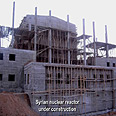
Suspected Syrian reactor (archives)
צילום: AFP
US: Syria risks IAEA action over suspected atom site
Washington's envoy to UN nuclear agency says it is 'urgent and essential' that Damascus heed inspectors' requests for extended access to sites, personnel and material
The United States warned Syria on Friday it may face action by governors of the UN nuclear watchdog if Damascus fails to give its inspectors access to the remains of a suspected nuclear site in the desert.
It has been over two years since the International Atomic Energy Agency (IAEA) was allowed to visit the Dair Alzour site in Syria where secret nuclear activity may have taken place before it was bombed to rubble by Israel in 2007.
US intelligence reports have said it was a nascent North Korean-designed reactor geared to produce bomb fuel. Syria, an ally of Iran which is under IAEA scrutiny over its uranium enrichment drive, denies hiding nuclear work from inspectors.
Glyn Davies, Washington's IAEA envoy, said in a speech posted on the US mission's website on Friday it was "urgent and essential" that Syria heed UN inspectors' requests for extended access to sites, personnel and material.
"Absent clear action by Syria to cooperate fully with the IAEA, we are rapidly approaching a situation where the (IAEA) board (of governors) and secretariat must consider all available measures and authorities...," he said.
Davies said earlier this year that a number of countries were beginning to ask whether it was time to invoke the IAEA's "special inspection" tool to give its inspectors the authority to look anywhere necessary in Syria at short notice.
'Circumstances cry out'
The Vienna-based, UN-affiliated body last resorted to such a prerogative in 1993 in North Korea, which still withheld access and later developed nuclear bomb capacity in secret.
Syria is now seen as unlikely to yield to a special inspection. Diplomats and analysts believe the IAEA will refrain from escalating the dispute at a time of rising tension with Iran, which the West suspects of seeking nuclear weapons.
If Syria were to reject a request for a special inspection, the 35-nation IAEA board could vote to refer the issue to the UN Security Council, as it did with Iran's dossier four years ago. The board next convenes in early December.
The former global director of IAEA inspections, Olli Heinonen, said that in Syria's case the "circumstances cry out" for deploying a special mission because of its reluctance to give the IAEA access to relevant persons, equipment and sites.
"Special inspections should not be treated lightly but when they make it possible to clarify the picture...the world community must not shy away from them," Heinonen, who left the IAEA in August, wrote in an article on Friday for the Washington Institute for Near East Policy.
In September, an IAEA report said Syria's continued refusal to allow inspectors access to Dair Alzour meant that potential evidence would be ever harder or impossible to unearth.
Syria has said the agency does not need to go back to Dair Alzour because it already has "ample proof" it was a non-nuclear military site -- a position contradicted by successive IAEA reports. It has also suggested that uranium particles discovered there came from Israeli weapons used in the attack, something that IAEA sleuths have said is highly unlikely.
Syria's case has been overshadowed by the more high-profile dispute over Iran's nuclear activity. Tehran rejects Western accusations its program has military aims.
One important difference between the two, diplomats say, is that Iran's work is still going on while the Syrian site was destroyed.
- Follow Ynetnews on Facebook










